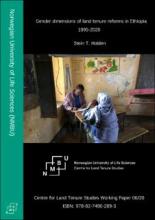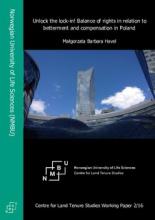Land Library
Welcome to the Land Portal Library. Explore our vast collection of open-access resources (over 74,000) including reports, journal articles, research papers, peer-reviewed publications, legal documents, videos and much more.
/ library resources
Showing items 1 through 9 of 49.This chapter investigates how land tenure reforms in Ethiopia have influenced the position of women in terms of land tenure security, access to land, decision-power over land within households, as well as the gendered impacts of these tenure reforms on land investments, land productivity, land re
This report presents two papers developed in order to study behaviour in trust games in 18 Malawian villages in 2007.
Continued high population growth in already densely populated rural areas in parts of Sub-Saharan Africa makes it harder for youth to choose agriculture as their main source of income. We investigate whether near landless youth can still access rented land as a complementary source of income.
This chapter is written for the European Commission for a book to be published by Springer on The Role of Smallholder Farms in Food and Nutrition Security. The author takes full responsibility for the content.
The ways in which people obtain land in Uganda are changing fast. Land that used to be secured through inheritance, gifts or proof of long-term occupancy is now more commonly changing hands in the market.
Northern Uganda is currently recovering from a 20-year long civil war that left the area in ruins. One of the groups, the Lord’s Resistance Army, orchestrated brutal mass murders and abductions forcing nearly two million people to live internally displaced people’s (IDP) camps for over 10 years.
The need to establish the link between land tenure and food security is increasingly gaining currency as governments and development organizations refocus their effort towards assisting farmers to move away from subsistence farming to commercial agriculture.
The ways in which people obtain land in Uganda are changing fast. Land that used to be secured through inheritance, gifts or proof of long-term occupancy is now more commonly changing hands in the market.
Many Polish cities are faced with a dilemma: to enact their local land-use plans and be exposed to the immediate financial consequences of their adoption, or to protect their budgets against these costs and give up control of the development of the cities.









